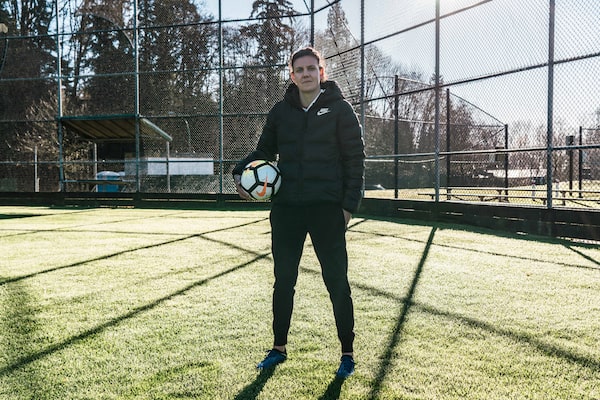
Soccer star Christine Sinclair urges Canadians to help defeat MS through acts of greatnessNora Stankovic / Canada Soccer
Christine Sinclair is one of the most successful soccer players this country has ever seen.
The 35-year-old native of Burnaby, B.C., has numerous accomplishments under her belt, including a gold medal at the 2011 Pan American Games and two bronze medals at the 2012 and 2016 Olympic Games. Christine also has a special connection to multiple sclerosis (MS) – her mother, Sandi, has lived with the disease for Christine’s entire life.
MS is classified as an autoimmune disease of the central nervous system which can cause symptoms such as fatigue, lack of coordination, weakness, impaired sensation, vision problems, bladder problems, and cognitive and mood changes.
This year, the Multiple Sclerosis Society of Canada made Christine honorary chair of their Acts of Greatness campaign. The goal of the campaign is to raise $75-million to support people living with MS and accelerate the pace of MS research and breakthroughs. Everyone is capable of acts of greatness, whether it’s through donating, volunteering or becoming a member of the MS Society.
In the midst of her busy schedule as a professional athlete, Christine took a moment to share why she’s committed to her role with the MS Society and the Acts of Greatness campaign:
Why did you become involved in the MS Society’s Acts of Greatness campaign?
I’m at a point in my career where I feel like I can make a bigger difference beyond just what I do on the soccer field. Obviously, that’s something I’m passionate about, but this is about truly being able to help make a change and impact people’s lives.
What is an act of greatness to you?
I think people think you have to do something massive, but to me, it’s the small things that you can do throughout the course of a day that can truly make a difference. For example, if everyone donated a dollar to a cause, what an impact that could make.
How has MS affected your mom’s life and your own?
My mom was an athlete – she did track and played soccer, and she was my soccer coach growing up. And it was hard as a kid seeing that being taken away from her, and not understanding why. And then as it progressed, she stopped working, she was in a wheelchair, and she’s now in a care facility. It’s hard to see.
What do you think you’ve learned through this journey with your mom?
That she’s the strongest person I know. Just seeing her positive outlook has been inspiring, and seeing her with her grandkids. It’s put a lot of things in perspective for me in what I do in my career. On those days when it’s physically demanding, and you’re completely gassed and when there’s nothing left in the tank, I think about my mom a lot during those moments. And for me it helped me push through that, knowing what she’s gone through, literally fighting for her life.
What would you like to see for people like your mom who have MS?
It’s been very hard for my family and my mom, especially when she was living at home as the disease progressed. She didn’t talk about it a lot with me, but I do know she felt completely alone in fighting this disease. I don’t want other families to go through what my family has gone through and my mom went through. There needs to be more support, to help people find out what kind of care and help is available to people living with MS.
What message would you like to get out there?
I find a lot of people don’t know much about MS and its impact on Canadians, so I just want to get the message out there. I also want people to know they can make a big difference with just a small act.
Advertising feature produced by Globe Content Studio. The Globe’s editorial department was not involved.